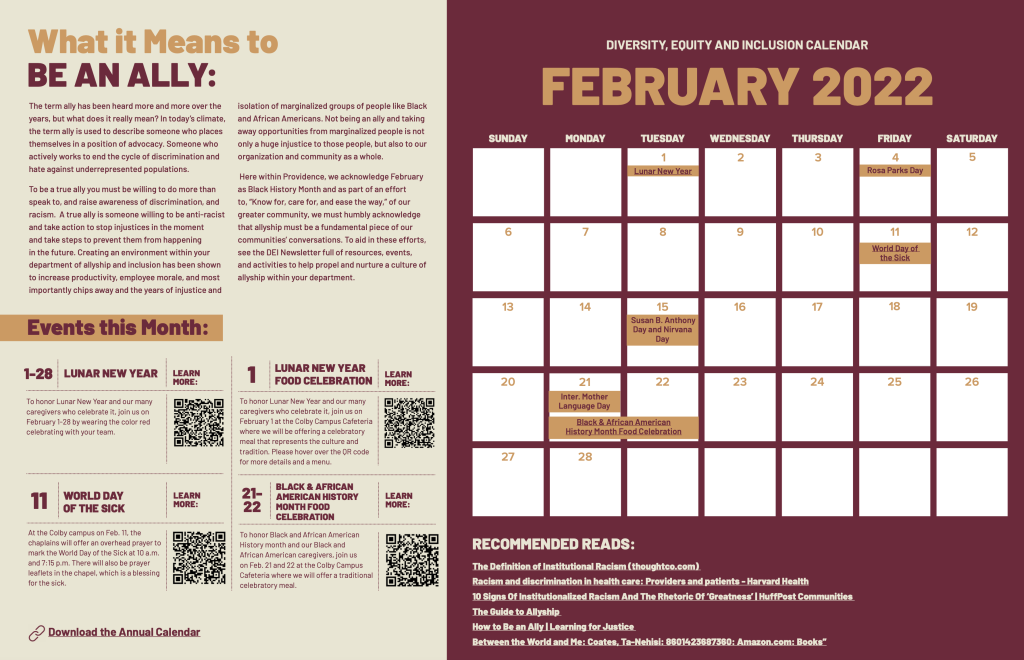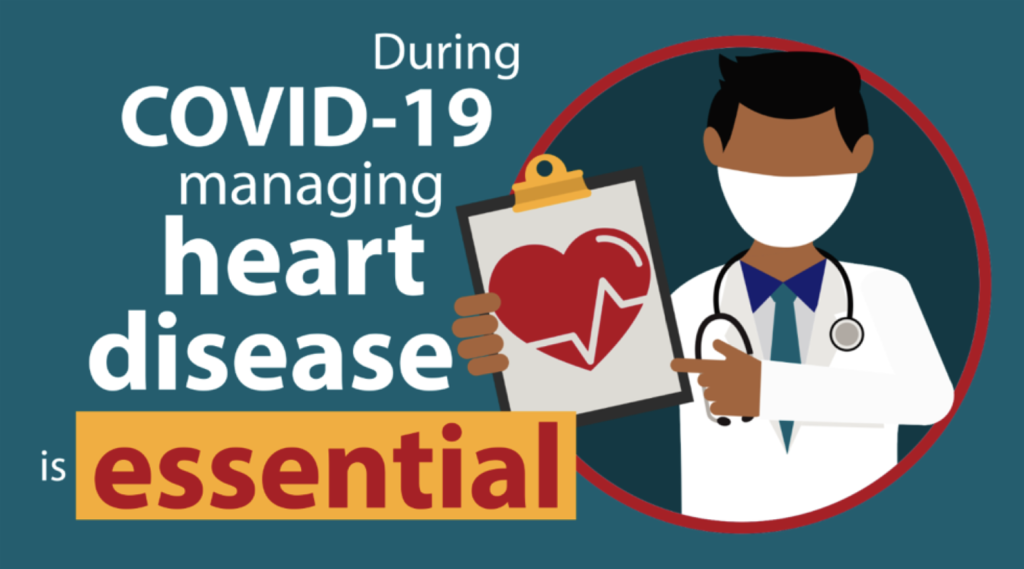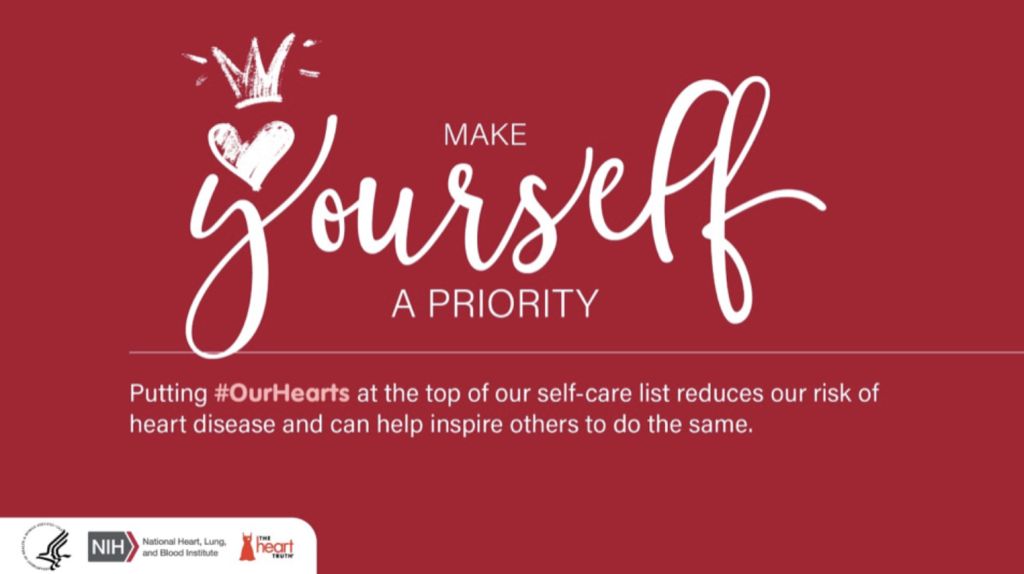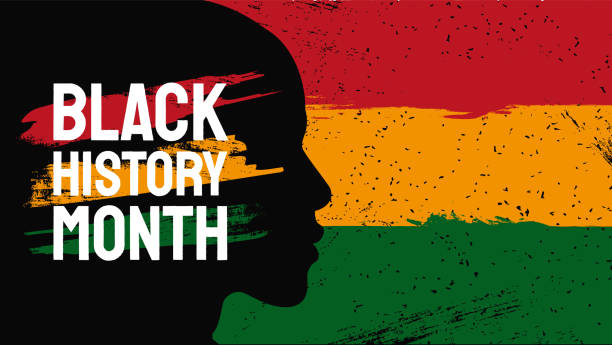Welcome to the NWSA’s Caregiver DEI & Well-Being Centered Newsletter
Thank you for being a part of the positive change and implementation of diversity, equity, and inclusion (DEI) to all who walk our halls here at Providence. We have heard your voices and requests for access to upcoming DEI events and information to aid you in implementing some of these celebrations and resources within your departments. One way we have provided easier access to this information is by creating a DEI newsletter that will be sent to you each month. We hope this newsletter and calendar help in taking the burden off of each of you to come up with a plan to create a more inclusive environment and support you in any way we can.
Purpose of Newsletter: To Equip you! Empower you! To Embrace the Full You!
Our goal is to aid you and your team with resources, activities, and opportunities to shine a light on different DEI celebrations throughout each month. We hope this newsletter and calendar helps in taking the burden off of each of you to come up with a plan to create a more inclusive environment and support you in any way we can. Resources you will find within the newsletter include:
-
- Access the interactive monthly multicultural calendar where you and your team can easily sign up to participate in different holidays/traditions we will be celebrating.
- Gain access to learning boards on the topic of the month as well as pertinent videos, articles, and links.
- Easy access to DEI & Well-Being Grant applications to fund projects and serve your departments DEI and well-being needs.
- Local caregiver spotlights and Diversity and Wellbeing Committee updates.
Monthly Multicultural Calendar

To open the clickable calendar, click on the image above. The calendar is also located here: DEI Calendar.
Our monthly Multicultural Calendar is a guide to the holidays of the month as well as events/celebrations that the DEI has planned. Each calendar has QR codes that will send you to flyers with more details about each event. If you need assistance in the implementation of any of these projects, have questions about the event, or if you would like to share pictures of how your department celebrated, please email [email protected].
Ideas for Implementation of February’s Events:
- Empathy starts with active listening – Knowledge is power! The first step to allyship is understanding the reality of those we are seeking to serve, support, and empower. While it is impossible to comprehend the depth of another person’s experience fully, there is power in at least having a framework of reference. Often, People of Color experience cultural fatigue, trauma, and exhaustion because they go to work in environments that do not understand their culture and background. Likewise, they become fatigued with being the ones responsible for educating and informing others about their values, experiences, and perspectives. To relieve the People of Color community from this burden, allies have a responsibility to learn on their own. For examples of learning opportunities, see the attached learning board material for some educational links and historical information regarding institutionalized racism. Please look and reach out with any questions.
- Once you have reviewed the learning board information on institutionalized racism and Black and African American Allyship, take that information and share it with your team. Go over the information at your next team meeting, create goals with your team to improve the overall cultural competency within your department. If further assistance is needed, reach out and we can schedule a lunch and learn with your team.
- “Don’t Just Talk About It… Be About It” After it is discussed with your team and goals are set, perform gut checks throughout the quarter to make sure things are staying on track and you are maintaining your sense of allyship and support.
- Create a safe place of belonging within your department. Be intentional with your leadership and project the behavior and allyship you expect to see from your team.
- Advocate for the hiring and promotion of Black and African American people and other people of color in your department and at Providence as a whole.
- Create a no tolerance atmosphere for racist and intolerant speech, behaviors, and energies.
- Reference the Multicultural Calendar to see monthly holidays and celebrations. For example, be sure to visit our Colby Cafeteria throughout the month for our Black History Month and Lunar New Year food celebrations! For more details, contact [email protected]. Also, if you are interested in celebrating Black and African American History Month in your office, please print out the included flyers to showcase some of the amazing men and women who have impacted the story of Black and African American history.
- Decorate your office to reflect culturally diverse holidays for that month.
- If you have any questions regarding this month’s theme or would like further training opportunities for your team, please reach out to [email protected] or [email protected].
Looking Ahead: Get Started on planning for March
- If you would like to participate in the next round of Poses with Providence scheduled for March 11 2022 at 7pm, please email [email protected] to be added to the list. Poses with Providence is a free virtual yoga class offered to all Providence caregivers taught by yoga teacher and local business owner Jackie Adams.
- Plan a time within your department to celebrate Holi, the Indian celebration of colors and love! Holi is celebrated on March 18.
- Keep an eye out for the attachment in next month’s newsletter with facts regarding women’s inequality. We recommend you print out the posters and hang them throughout your workspace. Use these facts as talking points at your next staff meeting and explore ways you could address equality within your team.
Monthly Learning Board Theme & Content Resources
February 2022 Topic of the Month-Black and African American Allyship
Let’s Rise Together!
Caregiver Stories Request
We know that Providence has employees from a vast array of different backgrounds, cultures, belief systems, circumstances, and more. It is a privilege to work for a place where we can all learn so much from one another if given the chance. This section of our newsletter is one of those chances. Below is a list of some of our upcoming holidays, celebrations, and monthly themes. If you have a personal connection to any of these topics (or another DEI/Wellness story unrelated to these topics) and feel comfortable sharing, we would love to hear from you. Please reach out to [email protected] for more details. Those who participate will receive a gift for your time and energy 😊
- February- Lunar New Year
- February- Black and African American History Month
- March- Women’s Equality Month
- March- National Deaf History Month
- March- Holi
- And more, check out the link above to our annual multicultural calendar!
February is Heart Health Month- Supporting and Educating our Diverse Patients
February is chock-full of wondrous things!
We have Black History Month, the Lunar New Year – Year of the Tiger, and Heart Health Month. Heart disease is a leading cause of death for both men and women in the United States. Health problems that increase the risk of heart disease are common in African American communities, including being overweight and having high blood pressure, high cholesterol, and diabetes. Having multiple risk factors increases your risk for heart disease. People with poor cardiovascular health are also at increased risk of severe illness from COVID-19.
South Asians represent approximately 25 percent of the world’s population – yet they account for 60 percent of the world’s heart disease patients. South Asians living in the U.S. are more likely to die from heart disease than the general population. South Asians have a higher risk of heart disease than other Asian groups, especially East Asians from China, Japan and Korea.

Here are some facts, how-to tips, and resources to inspire you to join with others, even if you can’t be physically together, to improve your heart health.
Why is connecting good for your heart?
Feeling connected with others and having positive, close relationships benefit our overall health, including our blood pressure and weight. Having people in our lives who motivate and care for us helps, as do feelings of closeness and companionship.
Did you know that people who have close relationships at home, work, or in their community tend to be healthier and live longer? One reason, according to the National Heart, Lung, and Blood Institute (NHLBI), is that we’re more successful at meeting our health goals when we work on them with others. NHLBI launched the #OurHearts movement to inspire us to protect and strengthen our hearts with the support of others.

Wear Red Day!
February 4 is National Wear Red Day. The first Friday each February, American Heart Month, the nation comes together, igniting a wave of red from coast to coast.

Looking for more information and support? Please stop by one of our informational tables throughout February, located at Colby, Pacific, Monroe, and Mill Creek. Click here to find information and resources and learn more about NW service area commitment to equity and well-being for caregivers.
- American Heart Month. National Heart, Lung, Blood Institute. (2021, February 5). Retrieved January 7, 2022, from https://www.nhlbi.nih.gov/health-topics/education-and-awareness/heart-month/drop-in-articles.
- Black History Month – February. Office of Minority Health Resource Center. (2021, October 12). Retrieved January 7, 2022, from https://www.minorityhealth.hhs.gov/omh/content.aspx?ID=9326/.
- Sandeep Krishnan, MD, RPVI, FACC. (2019). South Asians and cardiovascular disease: the hidden threat. American College of Cardiology: https://www.acc.org/latest-in-cardiology/articles/2019/05/07/12/42/cover-story-south-asians-and-cardiovascular-disease-the-hidden-threat.
Additional Team Resources
- APPLY FOR A DEI & WELL-BEING GRANT: As mentioned above, another way the DEI team hopes to support you in DEI efforts is to offer a grant program to help pay for some of your creative ideas. From buying books for a book club to funding decorations for celebrating an important tradition to purchasing items to create a “Zen Den” where caregivers can go to relax during breaks, and more, the grant program is here as a resource to you! For more information or to apply for a grant, please see here.
- If you or anyone in your department is interested in learning more about DEI and Wellbeing, or would like to participate in some of our action planning, please email [email protected] about joining our Diversity and Wellbeing Committee here at Providence.
- For additional resources about DEI and caregiver wellness, click here to be sent to our Caregiver Resource Hub.
Quote Corner: Print and post them around your department!
- “If you are neutral in situations of injustice, you have chosen the side of the oppressor.” – Desmond Tutu
- “In a racist society it is not enough to be non-racist, we must be anti-racist.”—Angela Davis
- “No matter how big a nation is, it no stronger than its weakest people, and as long as you keep a person down, some part of you has to be down there to hold him down, so it means you cannot soar as you might otherwise.” – Marian Anderson
- “But all our phrasing- race relations, racial chasm, racial justice, racial profiling, white privilege, even white supremacy- serves to obscure that racism is a visceral experience that blocks the airways, rips muscle, extracts organs, cracks bones, break teeth. You must never look away from this. You must always remember that the sociology, the history, the economics, the graphs, the charts, the regressions all land, with great violence, upon the body”—Ta-Nehisi Coates
- “No one is born hating another person because of the color of his skin, or his background, or his religion. People must learn to hate, and if they can learn to hate, they can be taught to love, for love comes more naturally to the human heart than its opposite.” — Nelson Mandela
- “The beauty of anti-racism is that you don’t have to pretend to be free of racism to be an anti-racist. Anti-racism is the commitment to fight racism wherever you find it, including in yourself. And it’s the only way forward.” — Ijeoma Oluo.
Diversity Cooking Class – A monthly recipe highlighting the cuisine of culture’s from around the world.

February: Malawah (Somali Sweet Pancakes)
Ingredients:
For the Malawah Pancakes
- 320 g All-Purpose Flour
- 185 ml Plant Milk
- 1 Large Egg
- 1/4 tbsp. Cinnamon
- 1 Pinch of Salt
- 1 tbsp. of Sunflower Oil
- 85 g Sugar
For the Apple Sauce
- 300 g Apples
- 1 Tbsp, Honey
- 1 Teaspoon of Lemon Juice
- 1 Tbsp. Starch
Instructions:
- Peel and cut the apples into small pieces. Then put them in a pan and add Lemon Juice and Honey into the Pan and let it cook at middle heat for 20 minutes. Sift in the Starch notch and stir until the apple sauce thickens. Once the Apple Sauce is thick, set it aside and let it cool.
- For the Pancakes, mix all the ingredients together. Now add oil to the pan and put a large spoon of pancake batter into the pan and fry one side for 3 – 5 minutes at medium heat.
- Put the apple sauces onto the Pancakes and enjoy.
Hosted By:
-
- Kaila Alvarez- Diversity Equity & Inclusion Manager [email protected]
- Brooke Chhina- Diversity Equity & Inclusion Committee Member [email protected]
- Jessica Burt- PIHC Program Ops Manager, Community Health and Caregiver Equity & Well-Being [email protected]



